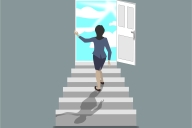You have /5 articles left.
Sign up for a free account or log in.

studiogstock/istock via getty images
Over the past months, I have interacted with thousands of faculty members at my institution and across the nation. I’ve witnessed repeatedly how much faculty care about each other and their students -- from trying to reach and engage every student to assuming the role of therapists and confidants. You take much pride in the work you do.
As I write these words, I recognize that many of you are struggling with uncertainty, with isolation and with political divisiveness. Many of you relish your time with your students inside the classroom where you begin to lose yourself in the process of learning with your students. Undoubtedly, many of you are missing and longing for that community.
In the midst of all of that, you are continuing to teach and serve your students, sometimes with little resources. You have not stopped giving. Many of you have been going nonstop since March, or before. To that, I want to say that not only am I proud of your perseverance and dedication to your students, I am also humbled and grateful to be your colleague and to learn from and with you. Your resolve gives me hope that we can forge a post-pandemic higher education that is rooted in love, beauty, justice and liberation for all students.
Over the past several months, I’ve been reading, studying and sitting with Kahlil Gibran’s poem “On Pain.” Gibran reminds us that “Pain is the breaking of the shell that encloses your understanding. Even as the stone of the fruit must break, that its heart may stand in the sun, so must you know pain.” This wisdom is echoed in the West African understanding of pain. Unlike Western medicine, the West African philosophy of medicine teaches us that pain is not a symptom but a sign that guides us to the root of the problem. Pain is not “cured” but only disappears when the root of the problem is understood and corrected. I have been asking myself what lessons and wisdom can I learn from our current times and how can I harness the guiding power of pain to serve others.
In the weeks before the election, my anxiety would ceremoniously visit me every morning and hang out with me until I called it a night. I often found myself wondering, “Does it matter?” “Does anything I do -- working with students and faculty -- matter?” Yet when a student of mine asked me a week before the election if voting matters, I was surprised at how quickly I answered, “Of course it does.”
In fact, I emailed my students and reminded them that even if their vote doesn’t matter numerically, it does symbolically. As someone who grew up in a country run by a dictator, I have always intimately cherished the amazing prerogative to vote -- a cornerstone of a democracy: governance by and for the people. The recent presidential election sent a loud and unequivocal message that Americans remain almost evenly divided, at least given the binary choice of Trump or Biden. Deep down, however, I want to believe that we are all far more united: through kindness toward our neighbors, loyalty to our friends, fidelity to our family, honesty with our colleagues and passion for our teams, our hobbies, our interests and the liberty to pursue them.
As a teacher, I ask myself, “What if the election were a scenario that took place in my classroom, and half my class was divided over a topic, a theory, a choice. What would I do?” Would I blame the division on people’s inability to listen, understand, relate, connect, compromise, share or give? Would I "sit in the pain" and allow it to guide me to understand and begin to heal?
During these turbulent and painful times, educators have an awesome opportunity to leverage the healing power of empathy and relationships. You are helping forge a post-pandemic future that is grounded not only in new pathways and technologies but also in love and justice.
So how do we teach in a lonely, divided, uncertain and disenfranchised world? How are we to teach while many of us are distressed by the awareness of others or even our own brokenness?
You’ve been doing that already, for months. For many of you, your physical separation from your classroom has not stopped you from revealing your humanity to your students and allowing your empathy to soothe their anxiety and loneliness. Your brilliance is felt throughout the community and the nation. Continue to lead and shine, or as Rumi says, “Keep Walking” and “Let the beauty we love be what we do.”
But how do we keep walking and find clarity and resolve alongside the tensions of the moment? The answer will be different for many of us, so I have some offerings to share with you. Take what resonates with you and leave the rest.
- Know that you matter -- as does your work at your institution -- to your students and your community. Your well-being matters. If you are feeling overwhelmed, pause and reach out to your colleagues and friends for their support.
- Resist comparing your internal state to other people’s external ones. Regardless of social position or identity, these times are undeniably stressful. We all cope differently; it is safe to assume that many of us are having ups and downs on a daily basis.
- Check up on your colleagues. Remind them that they are part of your college or university community and you care about them and their well-being. A genuine “How are you feeling?” and “I see you” will go a long way for a person who is having a hard time navigating and may not feel comfortable asking for help. As the incomparable Toni Morrison reminds us about friendship, "She is a friend of my mind. She gather me, man. The pieces I am, she gather them and give them back to me in all the right order."
- Encourage your students to check up on their classmates. Remind them that nurture is our nature. This small act of kindness will surely have a ripple effect. For example, you can ask your students at the beginning of class (or on the discussion board) to suggest ways we can impart empathy to each other. Share simple acts of self-care or random acts of kindness.
- Acknowledge that it might be hard to focus and learn in the coming weeks and months. Cultivate a learning sanctuary in your courses. Now more than ever, our students need to be reminded and reassured that they belong in our courses and at our institution. For example, take 10 minutes at the beginning of class to ask students how they are doing and to discuss how we can help each other feel safe, connected and seen. You might also consider reaching out to counseling professionals at your institution. Invite them to join your class and talk about coping strategies and mental health services the college offers. Normalize asking for help.
- Weave into your courses themes of hope and solidarity. Acknowledge that these are difficult times, and remind your students that we can find comfort and solace in poetry, music, beauty and community. For example, you can assign a five-point, extra-credit discussion post in which you ask your students to reflect on Emily Dickinson’s poem on “Hope.” Or ask your students to discuss, “How are we more united than we are divided?”
- Impart to your students that self-care is an act of hope and resistance. In the academy, we sometimes inadvertently perpetuate a culture of “toughen up,” or “pull yourself by your bootstraps.” Unfortunately, when we are under the influence of toxic stress, our physiology overrides our will. We don’t just snap out of it and keep working or learning in a meaningful way. Use your privilege as a teacher to model and normalize the need for self-care. For example, I share with my students resources that have helped me cope over the past few months, such as the Anxiety Coach podcast, the Happiness Lab podcast and the Love as a Force for Social Justice free online course.
- Remind yourself why you do what you do. When we are experiencing toxic stress, our brain becomes overwhelmed and may easily lose sight of the big picture. Your “why” can help you stay grounded and illuminate your path in the midst of uncertainty.
I recognize that the pandemic is not just a physical crisis or an institutional crisis -- it is also a profound emotional crisis. I am keenly aware that faculty are on the educational front lines and thereby occupy the single most important interface with students. No other group in the entire college or university community has the depth of contact to be able recognize the financial, social and academic challenges each student faces.
We know that students learn best when their whole beings are considered -- both the cognitive and the affective. Similarly, teachers will thrive -- and by extension students will, too -- when we honor each other’s humanity, recognize and celebrate our work, and empower each other to enact a politics of self-care. During these turbulent times, we long to be with others not merely because we are bored, but also because we recognize that our connections to each other -- with students and colleagues -- often calm our existential dread. It is that longing that propels us to keep walking.








